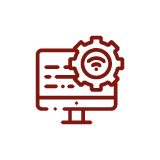In: RB ILT - Business Applications
Developer training. Microsoft Dynamics 365 Finance and Operations Apps Developers implement and extend applications to meet the requirements of the business. Candidates provide fully realized solutions by using standardized application coding patterns, extensible features, and external integrations.
Audience Profile
Microsoft Dynamics 365 Finance and Operations Apps Developers
Course outline
Module 1: Overview & Architecture
Describe the Dynamics 365 ecosystem and major components of the Dynamics 365 Finance and Operations (FO) software, describe the architecture of D365FO, describe relevant D365FO design and deployment considerations
Lessons
Explore the ecosystem and main components
-
Explore the technical architecture
-
Explore design and deployment considerations
Lab : Development Environment configuration and Project/Model Creation
Module 2: Developer Tools
Manage system implementations by using Lifecycle Services, Customize D365FO by using Visual Studio, Manage source code a...
Module 1: Overview & Architecture
Describe the Dynamics 365 ecosystem and major components of the Dynamics 365 Finance and Operations (FO) software, describe the architecture of D365FO, describe relevant D365FO design and deployment considerations
Lessons
Explore the ecosystem and main components
-
Explore the technical architecture
-
Explore design and deployment considerations
Lab : Development Environment configuration and Project/Model Creation
Module 2: Developer Tools
Manage system implementations by using Lifecycle Services, Customize D365FO by using Visual Studio, Manage source code and artifacts by using version control, Work with other development tools to complete tasks
Lessons
Manage implementations by using Lifecycle Services
-
Manage source code by using version control
-
Customize by using Visual Studio
Lab : Source Control using DevOps
Module 3: Solution Design
Determine the required application stack components and server architecture, Implement Application Lifecycle Management (ALM), Design a solution for D365FO
Lessons
- Implement application lifecycle management
Lab : Data Structure Development
Module 4: AOT Elements
Create forms, Create and extend tables, Create Extended data Types (EDT) and enumerations, Create classes and extend AOT elements
Lessons
Build extended data types and enumerations
-
Build tables
-
Build forms and optimize form performance
-
Create classes
-
Create other user interface elements
Lab : Metadata Extension & Development
Module 5: Code Development & Testing
Develop X++ code, Develop object-oriented code, Extend D365 FO functionality, Describe test framework and tools, Perform Unit Testing
Lessons
Explore the test framework and use tools
-
Get started with development using X++
-
Develop object-oriented code
-
Use RSAT tool
Lab : Code Extension & Development
Module 6: Data Migration
Describe migration tools and methodologies, Plan Migration strategy, Prepare data for migration and migrate data
Lessons
- Prepare data for migration
Lab : Data Export/Import using Data Entity
Lab : Recurring Data Transfer
Module 7: Frameworks
Implement D365 FO functionality
Lessons
Introduction
-
Explore extensions and the extension framework
-
Extend elements
-
SysOperationSandbox framework
-
Summary
Lab : SysExtension Framework
Module 8: Integration
Identify Data integration patterns and scenarios, Implement Data integration concepts and solutions, Implement Recurring integrations, Integrate D365FO with Microsoft Azure, Troubleshoot integration errors, Implement the Data Management Package API
Lessons
Identify data integration patterns and scenarios
-
Implement data integration concepts and solutions
-
Implement the data management package API
-
Data integrations
-
Integrate with Microsoft Azure
-
Connecting to Power Platform services
-
Consume business events
-
Integrate Finance and Operations apps with Microsoft Dataverse
Lab : OData Integration
Lab : Logic App Integration
Lab : Calling an External Web Service
Module 9: Reporting
Describe the capabilities and limitations of reporting tools in D365FO, Design, create, and revise Dynamics Reports, Design, create, and revise Dynamics workspaces, Design, create, and revise data sources that connect to data stores external to D365FO
Lessons
Explore the reporting tools
-
Build reports
-
Build workspaces
-
Manage data sources with external data stores
Lab : Power BI reporting from F&O
Module 10: Security & Performance
Describe and implement performance tools and LCS Environment Monitoring tools, Implement role-based security policies and requirements, Apply fundamental performance optimization techniques, Optimize performance for batch processes, Optimize user interface performance, Enhance Integration performance, Optimize Report Performance
Lessons
Work with performance and monitoring tools
-
Implement role-based security
-
Apply basic performance optimization techniques
Lab : Async & Sandbox Functionality
Show more
Durata
- 35 ore
- 5 giorni
Prerequisiti
Durata: 35 ore (5 giorni)
Solo su richiesta
Questo corso è erogabile solo su richiesta, in modalità on-line (con formazione a distanza), oppure on-site, sempre personalizzati secondo le esigenze.
















